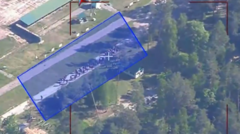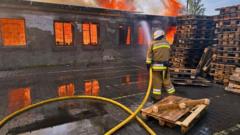A tragic missile strike in Ukraine's Sumy region resulted in the deaths of six Ukrainian soldiers, further intensifying the ongoing conflict between Ukraine and Russia.
Six Ukrainian Soldiers Killed in Missile Attack During Training Exercise

Six Ukrainian Soldiers Killed in Missile Attack During Training Exercise
Russian strike targets Ukrainian troops amid ongoing conflict in Sumy region.
The recent Russian missile attack during a training exercise in Ukraine's Sumy region has led to the tragic loss of six servicemen and left over ten others injured, as reported by Ukraine's National Guard. The incident has prompted critical discussions about military leadership and strategy in an already complicated situation on the battlefield.
The Russian Ministry of Defence earlier released footage showing its Iskander missile targeting a military camp, an act described by state news agency Tass as part of a broader campaign against Ukrainian forces. Reports suggest that as many as 70 personnel may have died from prior strikes on similar training sites, underscoring the rising casualties faced by Ukrainian troops.
The Sumy region has been subjected to repeated bombardments, with Ukraine initiating a protracted offensive into the neighboring Kursk region, aiming to establish a buffer zone for defense. However, some military personnel have expressed dissatisfaction about the high likelihood of losses stemming from the operation.
While President Vladimir Putin visited Kursk on the eve of the attack to meet local officials and volunteer groups, the strike on Ukrainian troops was condemned as a significant operational setback. The National Guard reported that the exercise was ongoing when the missile struck, leading to a suspension of the unit's commander and an ongoing investigation into the incident.
Moreover, reports by BBC Verify indicated that the targeted training camp was situated in the far northern part of the Sumy region, not far from the Russian border. Despite Ukraine's military insistence on having thwarted Russian attempts to create a "security zone" in the area, the Kremlin's procurement of North Korean soldiers to regain control reflects the escalating nature of the conflict.
Contrary to glimmers of hope for a ceasefire, President Zelensky has cast doubt on Russia’s willingness for peace talks, accusing the Kremlin of merely stalling to advance its military campaign. Meanwhile, former President Donald Trump has suggested that the Vatican might mediate future discussions, although the Vatican has indicated that this remains a tentative proposition rather than a definite plan.
With no signs of resolution in sight, the conflict continues to dominate the geopolitical landscape, posing grave risks and uncertainties for both countries involved.
The Russian Ministry of Defence earlier released footage showing its Iskander missile targeting a military camp, an act described by state news agency Tass as part of a broader campaign against Ukrainian forces. Reports suggest that as many as 70 personnel may have died from prior strikes on similar training sites, underscoring the rising casualties faced by Ukrainian troops.
The Sumy region has been subjected to repeated bombardments, with Ukraine initiating a protracted offensive into the neighboring Kursk region, aiming to establish a buffer zone for defense. However, some military personnel have expressed dissatisfaction about the high likelihood of losses stemming from the operation.
While President Vladimir Putin visited Kursk on the eve of the attack to meet local officials and volunteer groups, the strike on Ukrainian troops was condemned as a significant operational setback. The National Guard reported that the exercise was ongoing when the missile struck, leading to a suspension of the unit's commander and an ongoing investigation into the incident.
Moreover, reports by BBC Verify indicated that the targeted training camp was situated in the far northern part of the Sumy region, not far from the Russian border. Despite Ukraine's military insistence on having thwarted Russian attempts to create a "security zone" in the area, the Kremlin's procurement of North Korean soldiers to regain control reflects the escalating nature of the conflict.
Contrary to glimmers of hope for a ceasefire, President Zelensky has cast doubt on Russia’s willingness for peace talks, accusing the Kremlin of merely stalling to advance its military campaign. Meanwhile, former President Donald Trump has suggested that the Vatican might mediate future discussions, although the Vatican has indicated that this remains a tentative proposition rather than a definite plan.
With no signs of resolution in sight, the conflict continues to dominate the geopolitical landscape, posing grave risks and uncertainties for both countries involved.





















